A quick confession.. For a year or so now, I’ve found what has been, for me, a pretty healthy social media balance. I’ve needed to be on the apps intermittently, primarily for book and newsletter promotion, but have otherwise kept them at arm’s reach, especially Twitter. In the last few weeks, though, I’ve been overscrolling again, convinced in that vintage 2016/2020 way, that with So Much News happening that I had a civic duty to scarf as much of it up in real time.
I’m not happy with this development and hope to rectify it. It hasn’t made me a better, more engaged citizen. It’s just made me grumpier and more distracted. But I need you to know that I have been scrolling, because this essay won’t make any sense if you don’t know that I’ve been scrolling.
If you haven’t been scrolling, you might not have heard that there has been a decent level of talk online about the Zooms, the various affinity based fundraising/rally the troops calls for Kamala Harris. You already know my (slightly surprising) feelings on the currently-much-smaller-but-organizing-for-the-long-run Dads For Kamala group (there’s another call on Thursday, evening, by the way). But there have been so many calls. Big calls. There was a Black Women For Harris and Black Men for Harris. There’ve been South Asian calls and Latino calls. White women “answered the call” and raised a massive amount of money. And then, as you might have heard, there were the White Dudes for Harris.
That call came last night. I wasn’t involved. I’m aware of the organizers but am not in their circles. If they read this, I hope they’re feeling great about themselves. They put together something massive on short notice. More on that in a bit.
Remember how I confessed that I’ve been scrolling lately? Well, for the few days leading up to the call, a disproportionate amount of what I was seeing, particularly on Twitter, was a relatively ecumenical group of (mostly) men either upset or annoyed at the White Dudes call specifically. There were faux-angry conservatives, of course (including, notably, the owner of the social media platform itself, who would later go on to ban the White Dudes’ account), but there were also centrist and leftist voices, White guys and Black and Brown guys alike. Again, mostly men, which is fascinating, but might also be a function of the corner of the Internet I had stumbled upon. Here’s a small sampling (I’m deliberately leaving out the far right ones, because I would have been disappointed in those accounts if they weren’t mad about White Dudes for Harris).
I’m not sure if I have a unified theory of why this particular call rankled so many snarky feathers. I mean, I have a lot of theories, just not a single one. I’m sure a disproportionate amount of it is just that, well, it’s easy to mock White guys. Fair enough! I saw plenty of jokes about unseasoned food, Steely Dan and movies about boats, as there should have been. And then there were the substantive critiques. Ross Morales Rocketto, who organized the call, posited one of them during the event itself: "You know, throughout American history, when white men have organized, it was often with pointy hats on. And so I think that discomfort I think the skepticism is understandable.”
Rocketto’s onto something there. There are a ton of reasons for progressives to be suspicious of what happens when White guys rally together politically. But I don’t think that explains all the skepticism I saw filtering around. Many of the critiques were coming from folks who knew that this wasn’t a Klan rally or attempt at Charlottesville 2.0, but who still objected to what they anticipated the vibe of the call would be. The assumption— shared by both class-focused, Racecraft loving leftists and the kind of centrists who love making arguments about what kind of messaging will turn off the imagined Rust Belt voters— was that surely these spaces, which smacked of the kind of breakout rooms you’d find in employer mandated DEI trainings, were going to be cringy and embarrassing. Too self-flagellating, perhaps. Too paternalistic. Too focused on intra-managerial class theatrics than on any meaningful political mobilization. To cite a word that is currently at the center of political discourse, too weird.
Here’s a topic I’ve been circling around for a few months now, but haven’t put directly in writing. Much has been written about the predictable cycle of conservative backlash to the summer of 2020, how after a brief blip of racial reckoning we ran straight back to book bans and “migrant crime” panics and Governors declaring that their states were where woke went to die. But there seems to be a different, parallel movement amongst those of us who are aligned on the fact that racial, gender, and economic hierarchies exist and should be rectified. Namely, we got embarrassed. Particularly White progressives. We looked back at various strident social media posts about how we were decentering ourselves (loudly!), or the affinity group meetings where we cried about all that we had to unlearning, or (ugh) the overly familiar text messages we sent to Black people who we considered close friends but likely considered us acquaintances and thought oh jeez, that wast too much.
I get this embarrassment. Oh man, do I ever get it. I wrote a whole book about my regrets over the time I wasted performing racial and gender politics in a way that was sometimes cringey, often counter-productive, and almost always more about my own ego than about building a better world. To quote Tyler Austin Harper’s critique of the White Zooms, I have absolutely dabbled in some White saviorism and therapeutic psychobabble in my day.
Why write a book about all that rather than just run from it? Because we’re all still figuring out how to build a better world rather than just peacock around yelling at each other. And if that’s the case, there’s a benefit in holding all of our efforts to try to be decent neighbors– even the ones that now make us blush– with grace and curiosity. The times I made over-wrought statements about how I was wrestling with my complicity with systems of domination as a White guy? I learned them from somewhere. So too were the moments that I defined myself in opposition to other White men, as if I had arrived at some grand truth they hadn’t and that somehow, through my preening, I’d be absolved of all my guilt. It was a tremendously useful exercise to excavate why those became my default moves as well as what it took to care less about how good I was looking in the eyes of other college educated white collar progressives.
One thing I’ve heard from White people who’ve read my book is that many of them wish that it finished with me telling them what they should do now. Sure, I talk about how I discovered organizing and community building and stopped trying to separate myself from other White people to prove my righteousness, but I didn’t offer a cute little checklist about the actions you could and should take to be a non-weirdo White person. I get that desire, and my editor and I have even discussed a bit of an afterword in the paperback edition that will speak to that longing.
There are reasons why I didn’t give a checklist, though, why I didn’t lay out precisely how to organize with other people in ways that aren’t overly self-flagellating and divorced from actual material politics. On one hand, I didn’t know how to square a book that’s very much about me learning that there is no singular “right way” to be a White guy with a“let me give you the answers” coda at the end. But more importantly, welcoming people whose perch at the top of societal hierarchies often absolves them from, you know, giving a crap about other people isn’t actually that complicated. I mean, there are some new moves to learn. There’s a reason why I developed a whole set of trainings on how to do all that and why it felt important to offer those trainings for free.
But at its core, organizing in a way that is aware of the ways that White people (and White men in particular) often get in the way of progressive change while not being super weird about it isn’t all that hard. It’s about identifying a group that you hope will make a different set of political moves than has been their default and actually reaching out a hand and saying “hey, want to try something different?” You want wealthy White homeowners in Minneapolis or suburban Milwaukee to stop calling the cops all the time and opposing affordable housing efforts? Form a group with your neighbors, state your aspirations clearly, and start hosting house parties. You want rural Idahoans to support universal healthcare, public education and not voting for lowest common denominator reactionary ideologues? You fix up a broken RV and start knocking doors across the Gem State. You want White parents to stop fleeing economically and racially heterogenous schools for suburban citadels and progressive private schools? Just ask. And then keep asking.
What does this have to do with the White Dudes for Kamala? Well, something fascinating happened after the call started. The conservative criticisms kept piling in, but the snark from the moderates and the leftists largely disappeared. Some critics still argued that they disagreed with a call for White dudes specifically, but acknowledged that, actually, the content of the call itself was solid. A few of the tweets that I planned to use as being representative of pre-call criticism were deleted. Other critics went silent. I saw a couple full about-faces.
Why? As far as I can surmise, because the vibe of the call wasn’t tortured and self-flagellating. It was pretty straightforward. This was a gathering of people who wanted to elect a Black and South Asian Democratic woman President, and who recognized that the demographic group least likely to support candidate like that, historically, was White men. As a result, they reached out to White men and said “hey, you should do something to help that campaign. Give money. Volunteer. Be loud.” That, as far as I could tell, was the main message. No calls for never ending struggle sessions or emotional blog posts or filming TikTok’s of your oh-so contrite tears. Some big name actors and musicians and VP hopefuls showed up. The troops were rallied and money flowed in. If you’re somebody who’d prefer that Harris be elected President over Donald Trump, it was, by all accounts, a successful event. Perhaps not world-changing, but successfull.
There may still be people, on the left in particular, who believe that there’s no point in organizing efforts that are explicitly conscious of race and gender dynamics. The history of racism and sexism being used as a cudgel against class-based organizing efforts would suggest otherwise. But still, I understand the argument. It’s still hard for us to imagine doing any of this well. We don’t have enough examples of race and gender based organizing with White people and men that is actually effective, straightforward, and focused more on building than performing.
As for last night, I don’t believe that any of the Zooms for Kamala will singlehandedly change the world. Perhaps they’ll effectively funnel all their participants into durable, longitudinal social change efforts and not just a single campaign’s fundraising machine. Perhaps not. Even if nothing more comes out of the White Dudes call, though, it matters that an event like this— a specific request for a demographic group that has historically been more of a detriment than accelerant of progressive change to buck that pattern— was so thoroughly unweird and uncomplicated. Because that’s the thing. Social change is very hard, but it’s rooted, at its core, in a simple proposition. Identify a group of people that you’re worried won’t show up for the common good, reach out to them, and ask if they’re ready to give it a shot. Over and over again. Feet moving forward. Hands always outstretched.
End notes:
It was Anne Braden’s birthday on Sunday. Were she still alive, it would have been her hundredth. I celebrated by reading her last piece of public writing, which you can find in the collection Anne Braden Speaks. I was originally going to reprint an excerpt in this newsletter, because I think it’s prescient to this moment, but I wrote this instead so, with apologies to anybody who isn’t on Instagram, I posted it there instead.
Yes, as I referenced above, I run organizing trainings on how to welcome majority White communities into practical efforts for economic/racial/gender justice. And yes, they are free (though supported with donations). And yes, there’s gonna be a lot of demand for them (for obvious reasons!, so I need to announce when the fall sessions will be, and soon. That’s on me, and I promise it’s coming. If you want to be the first to know, though, sign up for the interest list (scroll to the bottom of the page). The only thing I use that email list for is to let you know when new classes are coming around the bend.
It’s been a while since I’ve done a song of the week, but if ever there was a time to bring back this newsletter’s most White Dude ritual, it’s this one. And jeez what an embarrassment of riches. I’m pleased with my choice, though. Phil Lynott was neither White nor American, and I have no idea the politics of the wild-eyed boys that had went away. I do know that they’re dressed to kill, and that if they want to fight you better let ‘em. Who’s back, you ask? I think you already know. Spread the word around.



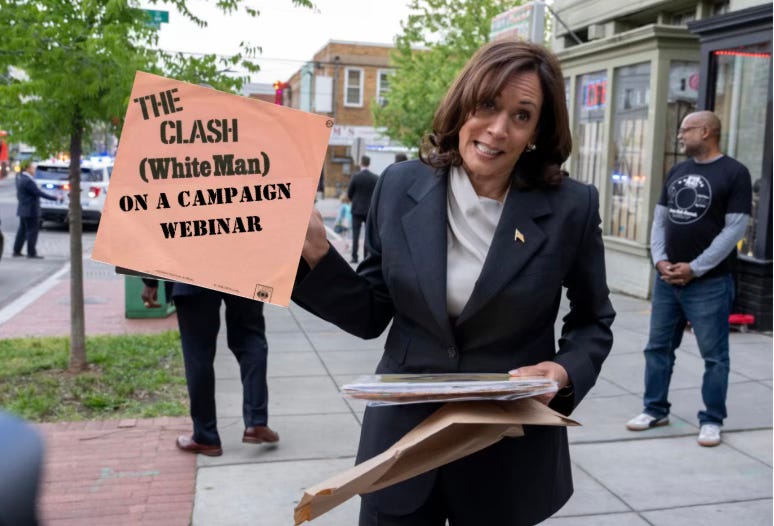
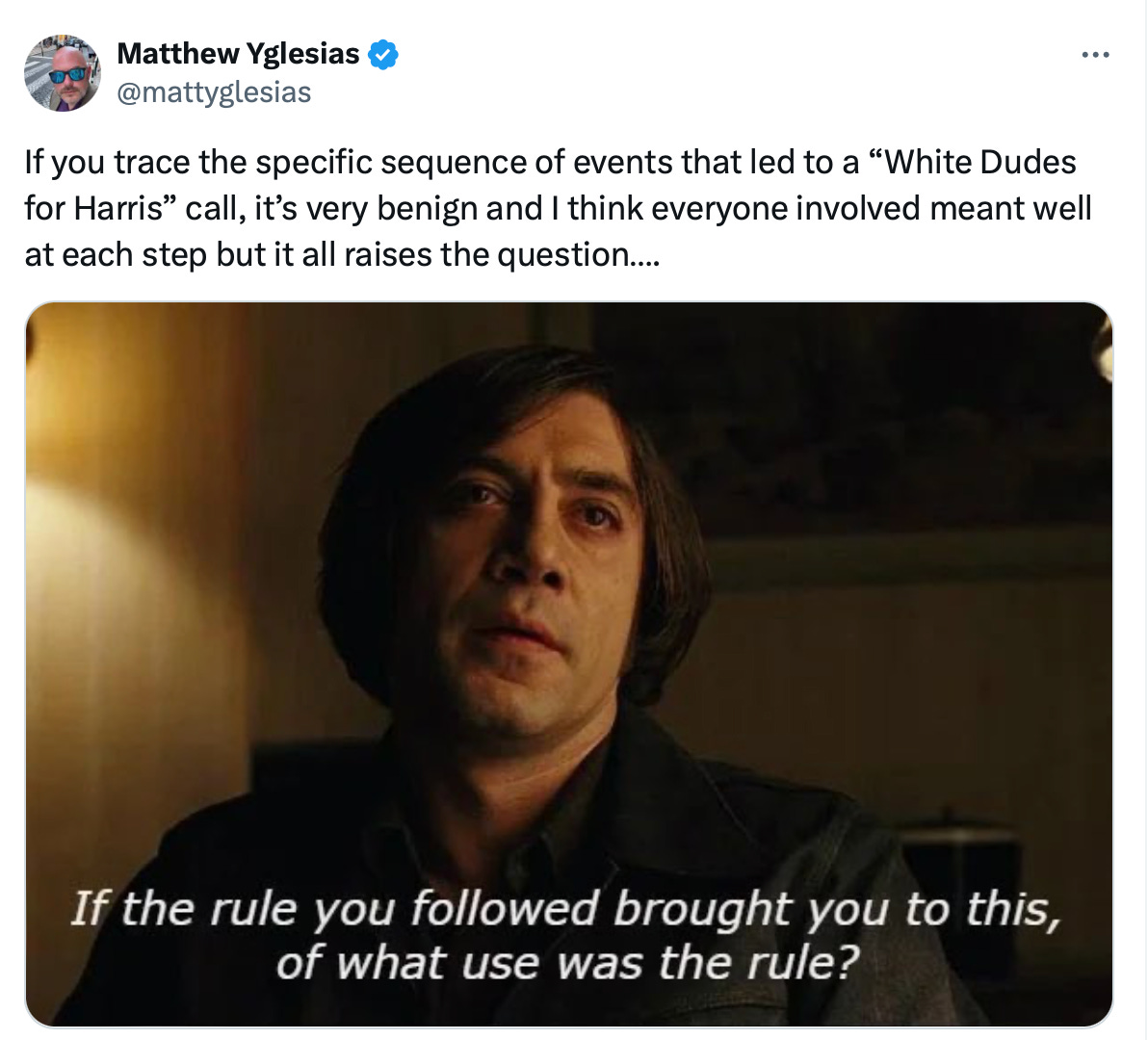
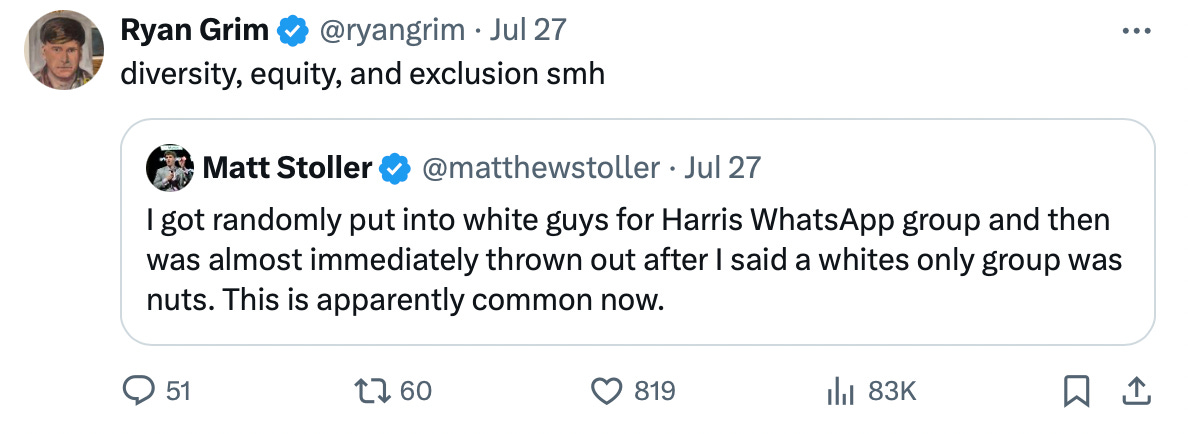

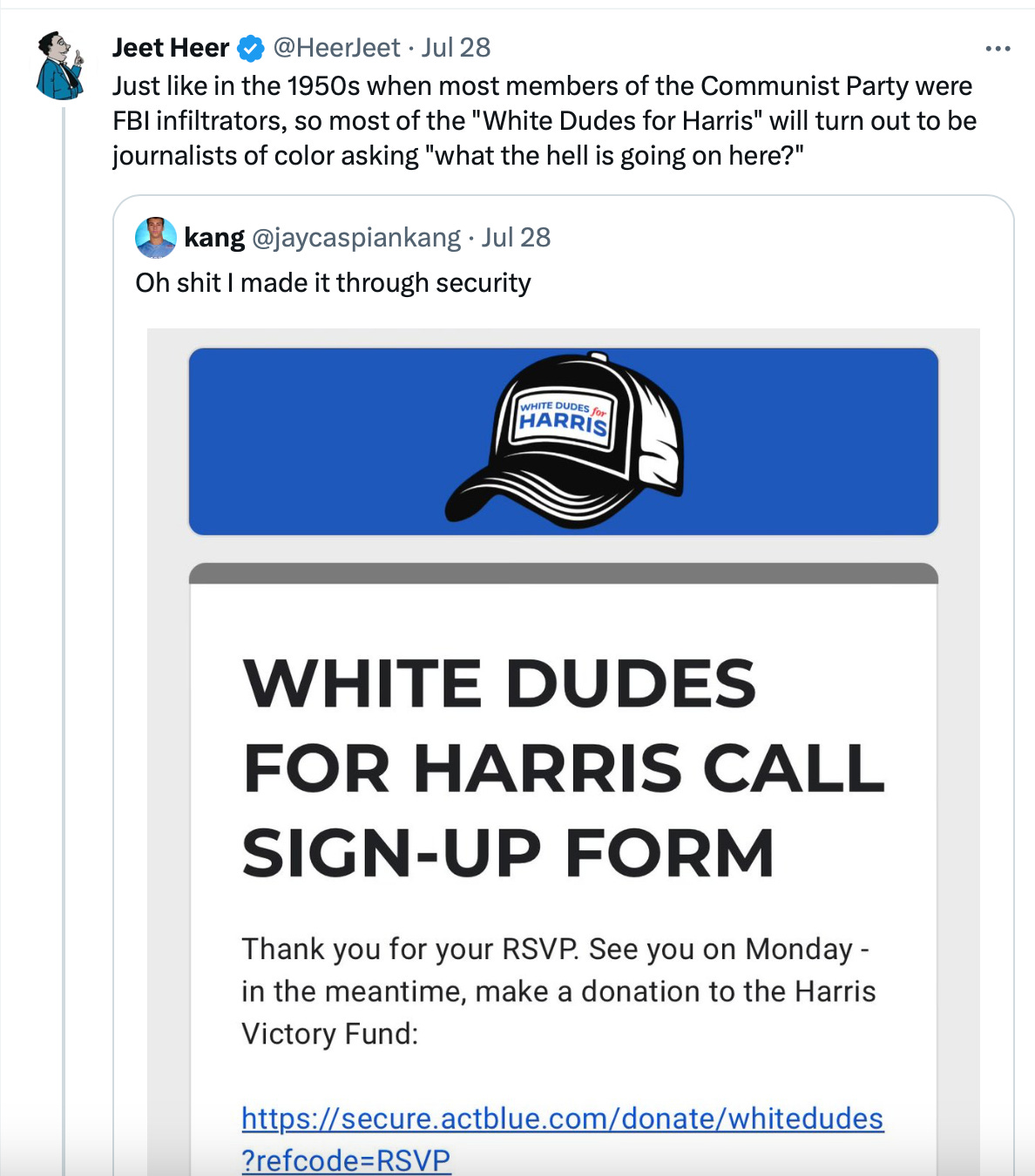
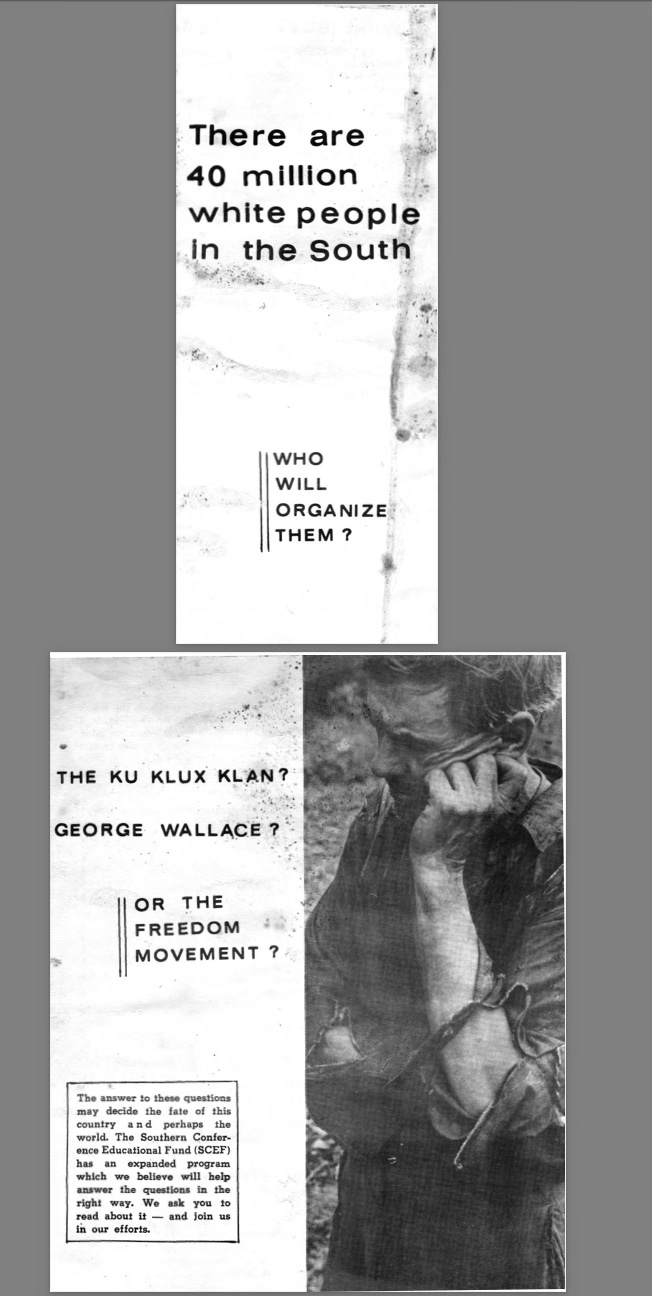
Hey there, whiteness scholar here --first time commenting but have been reading and appreciating your work for several months now. (Traveled in via either Lyz or AHP; can't recall which!) I just want to say that I appreciate a lot of what you are writing about here:
-For about a decade I ran a DEI campus program for white students to build their confidence and competence in contributing positively to inclusion and social justice on campus, and while I left that work about 5 years ago, I'm both exhausted, and not surprised, by the degree to which that knee-jerk reaction against caucus work still hangs around.
-I also initially built my dissertation around the dance that so many of us white folks do around our racial identities (a la NOFX Don't Call Me White), though in the end the work, and my first book, focused more on, because it was situated in, the complex terrain of posturing for diversity but divesting from it in neighborhoods and schools that you also rightly name here.
-A lot of my academic work was pushing for the very kind of ordinary (and therefore not- self-congratulatory) work that I'm relieved to hear you noticed on that call --just figuring out what specific thing is helpful in one specific environment, and ...doing it! I left academia and focus now on industry workspaces in my writing and efforts, but the story everywhere is the same: find a thing that some sound indicator suggests may be helpful, do the thing, figure out if it was helpful.... it's not rocket science, but so often we trip over ourselves along the way. Whew!
To that last point, thank you for being someone who does these things, and seems to do them well, and for nurturing the hard and necessary conversations about whiteness that help us collectively get there. Cheers!
Garrett, I had been hoping you'd weigh in on this, so thanks for that!
I, a cis female, had the call on while I was working, making dinner, etc. At first I was simply curious what on earth it would be about, but it pretty quickly became clear that it was primarily a telethon-style fundraiser. The first speaker was actually a Black man, Maurice Mitchell of the Working Families Party, and the final speaker was a female organizer, Erin Heaney, from Showing Up for Racial Justice, but in between, it was all White guys (beginning with the ur-Dude, Jeff Bridges). There was only one speaker that I thought was a total dud, and a handful that were genuinely great, including (of course!) Gov. Walz, Rep. Swalwell, Joseph Gordon Levitt (who wisely pivoted to strategy, with some talking points to drop if your fellow white dudes start going on about how Trump should be president because he's a successful businessman), Paul Scheer, and Wisconsin's own Ben Wikler.
And good on all the dudes (it *was* mostly dudes, based on the first names) who were donating to the Harris campaign! Toward the end of the stream, I made a donation, and indeed, a few minutes later, "Sue T. $25" came scrolling across the bottom. So when they say the call raised $4 million, I believe them.
One thing that came up was that only around 34% of White men voted for Biden in 2020 (I don't remember the exact figure, but it was something close to that), and if that number could go up by even a couple percentage points, it could greatly increase Harris's chance of winning. THAT'S why White Dudes for Harris is important. These guys are being told that they can make a real difference by voting and by talking to their fellow White dudes, and I hope they take that message to heart. Plus now there's a progressive alternative to the MAGA hat!